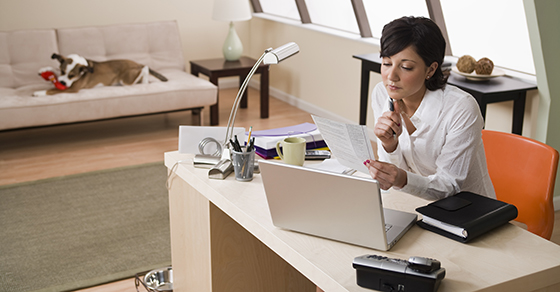Take a closer look at home office deductions

Take a closer look at home office deductions
Working from home has its perks. Not only can you skip the commute, but you also might be eligible to deduct home office expenses on your tax return. Deductions for these expenses can save you a bundle, if you meet the tax law qualifications.
Under the Tax Cuts and Jobs Act, employees can no longer claim the home office deduction. If, however, you run a business from your home or are otherwise self-employed and use part of your home for business purposes, the home office deduction may still be available to you.
If you’re a homeowner and use part of your home for business purposes, you may be entitled to deduct a portion of actual expenses such as mortgage, property taxes, utilities, repairs and insurance, as well as depreciation. Or you might be able to claim the simplified home office deduction of $5 per square foot, up to 300 square feet ($1,500).
Requirements to qualify
To qualify for home office deductions, part of your home must be used “regularly and exclusively” as your principal place of business. This is defined as follows:
- Regular use. You use a specific area of your home for business on a regular basis. Incidental or occasional business use isn’t considered regular use.
- Exclusive use. You use a specific area of your home only for business. It’s not required that the space be physically partitioned off. But you don’t meet the requirements if the area is used for both business and personal purposes, such as a home office that you also use as a guest bedroom.
Your home office will qualify as your principal place of business if you 1) use the space exclusively and regularly for administrative or management activities of your business, and 2) don’t have another fixed location where you conduct substantial administrative or management activities.
Examples of activities that meet this requirement include:
- Billing customers, clients or patients,
- Keeping books and records,
- Ordering supplies,
- Setting up appointments, and
- Forwarding orders or writing reports.
Other ways to qualify
If your home isn’t your principal place of business, you may still be able to deduct home office expenses if you physically meet with patients, clients or customers on the premises. The use of your home must be substantial and integral to the business conducted.
Alternatively, you may be able to claim the home office deduction if you have a storage area in your home — or in a separate free-standing structure (such as a studio, workshop, garage or barn) — that’s used exclusively and regularly for your business.
An audit target
Be aware that claiming expenses on your tax return for a home office has long been a red flag for an IRS audit, since many people don’t qualify. But don’t be afraid to take a home office deduction if you’re entitled to it. You just need to pay close attention to the rules to ensure that you’re eligible — and make sure that your recordkeeping is complete.
The home office deduction can provide a valuable tax-saving opportunity for business owners and other self-employed taxpayers who work from home. Keep in mind that, when you sell your house, there can be tax implications if you’ve claimed a home office. Contact us if you have questions or aren’t sure how to proceed in your situation.
© 2019

